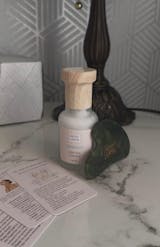What are “antioxidants,” anyway?
-
Antioxidants are molecules that neutralize free radicals and reactive oxygen species (ROS). Free radicals have unpaired electrons and are highly reactive—they damage DNA, lipids, and proteins. Nature+1
-
Our skin is exposed to free radicals from inside (normal metabolism) and outside (UV light, pollution, smoke, etc.). When the damage overwhelms our defenses, that’s “oxidative stress.” PubMed Central+2Frontiers+2
What antioxidants can do for your skin (proven by research)
Here are the key benefits—with some surprises.
| Skin Benefit | Mechanism / What Research Shows | Surprises & Important Details |
|---|---|---|
| Delay visible aging (wrinkles, sagging, fine lines) | UV exposure and oxidative stress degrade collagen & elastin, thin the dermis and reduce hyaluronic acid. Antioxidants reduce free radical damage, slowing that breakdown. PubMed Central+2Wiley Online Library+2 | Even intrinsic (natural) aging is significantly accelerated by extrinsic factors like sun and pollution. Antioxidants are more effective when applied before or during exposure rather than after damage has set in. PubMed Central+2PubMed Central+2 |
| Protect from UV and photodamage | They help “soak up” ROS that UV light produces, reducing DNA damage, preventing pigmentation issues, sunburn, etc. PubMed Central+3PubMed Central+3MDPI+3 | Antioxidants don’t replace sunscreen—they’re helpers, not stand-alone defenders. The timing of application (before sun exposure) matters a lot. Some antioxidants degrade in sun unless stabilized. ScienceDirect+1 |
| Improve skin tone & radiance, reduce pigmentation | Oxidative stress can increase melanin production (or make existing melanins clump or misbehave). Antioxidants can suppress this and help with more even tone. Clinical trials show antioxidant supplements/creams reduce color unevenness, brighten dull skin. Dove Medical Press+1 | Oral supplements can help, but results vary depending on how well the compound is absorbed and delivered to skin. Also, concentration and formulation matter. Frontiers+1 |
| Strengthen the skin barrier / reduce inflammation | When ROS damage lipids and proteins in skin barrier, it becomes leaky/inflamed. Antioxidants help protect lipids (e.g. in cell membranes), reduce inflammatory signaling, improve barrier function. PubMed Central+1 | Some antioxidants also help regenerate others (e.g. vitamin C helping vitamin E, etc.). But too much or unstable forms may irritate, so balance and formulation are key. PubMed Central |
| Support wound healing & repair | Oxidative stress delays healing. Antioxidants help reduce the damage and allow repair mechanisms to work better. BioMed Central+1 | The effect is more pronounced when damage is recent or moderate. Severe damage (deep scars etc.) may require more than just antioxidants. |
Surprising bits (that you might not expect)
-
More isn’t always better — At high doses or with unstable antioxidants, you can get pro-oxidant effects or irritations. Also formulation stability (how the antioxidant survives light, air) is critical. ScienceDirect+1
-
Oral + topical = synergy — Combining dietary intake of antioxidants (polyphenols, flavanols, etc.) with good topical products gives greater protection than either alone in many studies. Frontiers+1
-
Not all antioxidants are equal — Different types (vitamin C, vitamin E, coenzyme Q10, flavonoids, carotenoids...) act in different skin layers, with different potency. Some are fat-soluble, some water-soluble. Their ability to reach the right part of the skin, at stable concentrations, matters a lot. ScienceDirect+1
-
Lifestyle is major — Things like diet, smoking, pollution exposure, sleep all heavily affect oxidative stress. Antioxidants help, but can’t undo all bad habits. Frontiers+1
What the strongest evidence supports right now
-
Topical antioxidants (vitamin C, E, retinoids as antioxidant adjuncts) reduce signs of aging and damage from UV. PubMed Central+1
-
Oral dietary supplements of antioxidants & polyphenols can help slow “photo-aging” (aging caused by sun exposure), improve skin tone, firmness, and reduce dullness. Frontiers+1
-
Regular use (not just occasional) of antioxidant skincare helps maintain stronger skin barrier, reduce inflammation and protect against everyday environmental insults. MDPI+1
Practical tips: how to get those benefits
-
Choose stable, well-formulated antioxidant serums / creams (look for stabilized vitamin C, proper delivery systems)
-
Apply before sun exposure, and always use sunscreen. Antioxidants + sunscreen protect better than sunscreen alone.
-
Include antioxidants in diet: fruits, vegetables rich in polyphenols (berries, green tea, etc.).
-
Consistency matters: regular daily use yields better results in studies.
-
Be cautious with high concentrations if you have sensitive skin; patch test.
Summary: Why it matters
Antioxidants are like the backup backup crew for your skin: they help clean up the mess that gets past your primary defenses (your barrier, sunscreen, etc.). Used well, they:
-
slow aging
-
protect from UV/damage
-
brighten and even skin tone
-
repair & maintain barrier integrity
-
reduce inflammation
They can’t completely stop aging (nothing can), but they make a measurable difference. And some effects are more striking than people expect—better radiance, visible reduction in pigmentation, fewer fine lines when used over time.





